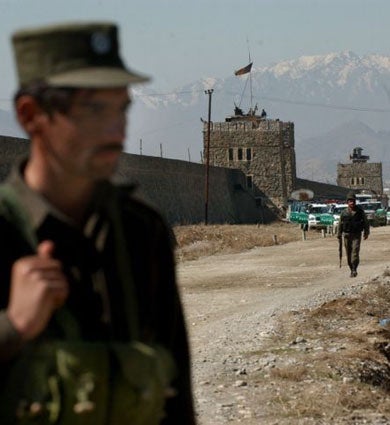Kabul's jail is overrun by 1,500 al-Qa'ida prisoners

Your support helps us to tell the story
From reproductive rights to climate change to Big Tech, The Independent is on the ground when the story is developing. Whether it's investigating the financials of Elon Musk's pro-Trump PAC or producing our latest documentary, 'The A Word', which shines a light on the American women fighting for reproductive rights, we know how important it is to parse out the facts from the messaging.
At such a critical moment in US history, we need reporters on the ground. Your donation allows us to keep sending journalists to speak to both sides of the story.
The Independent is trusted by Americans across the entire political spectrum. And unlike many other quality news outlets, we choose not to lock Americans out of our reporting and analysis with paywalls. We believe quality journalism should be available to everyone, paid for by those who can afford it.
Your support makes all the difference.At least 30 prisoners were injured and unconfirmed reports said seven others were killed in fighting after inmates took two female prison guards hostage in protest at new regulations requiring them to wear uniforms.
Bursts of gunfire could be heard throughout the day from Pulicharkhi prison after the Afghan police rapid reaction unit, armed with rocket-propelled grenade launchers, entered the complex in an attempt to prevent a mass break-out. Prisoners were heard chanting "Allah ho Akhbar" in between the firing.
Pulicharkhi, which holds around 2,000 prisoners, became notorious during Afghanistan's Communist era with allegations of torture and secret executions. About 110 detainees held by the US at Guantanamo Bay are expected to be transferred there later this year.
The prisoners had allowed 70 women inmates to be moved to another part of the prison after storming into the female wing from their own. As night fell, negotiations announced by the Interior Ministry to end the stand-off were suspended. Security forces had yet to gain access to parts of the jail under the prisoners' control.
"I have heard that prisoners have been injured. Taliban and al-Qa'ida members from different countries are behind this unrest," said the Deputy Justice Minister, Mohammad Qasim Hashimzai. "They still control the wing from where they had started the riot. They have demands; we are going to listen to what they want. If we cannot solve it through negotiations, we have our own options."
The violence began after inmates were issued with uniforms. Until then, they were allowed to wear civilian clothing but the rules were changed after seven suspected Taliban prisoners escaped last month pretending to be departing visitors. Prison guards are believed to have assisted with the escape.
General Mahboub Amiri, the chief of Kabul's rapid reaction police force, said Taliban members triggered the riot in an attempt to break out of the prison. "They started the trouble and then tried to use that as cover to get away," he said. "The injuries to prisoners happened while this was going on." Four policemen and four prisoners died in December 2004 during a day of confrontation at the prison when a group of alleged al-Qa'ida inmates attempted a break-out.
Yesterday, hundreds of heavily armed police and troops backed by tanks and armoured personnel carriers took position outside the jail. Security forces prevented journalists from approaching the building.
Abdul Salaam Bakshi, the prison director, said the inmates had attacked guards and tried to force their way out of their prison block. They had been armed with knives and clubs fashioned from wrecked furniture, he said, and had set fire to bedding. "All the problem is inside the prison," said Mr Bakshi. "We want to peacefully solve this problem."
Meanwhile, a new controversy has broken out over an even more sinister Afghan prison - the secret detention centre at Bagram air base, north of Kabul, where some 500 terrorist suspects are being held in conditions at least as harsh as at Guantanamo Bay.
In the most detailed account of the facility yet, The New York Times has reported that many prisoners were held by the dozen in large wire cages, where they slept on the floor on foam mattresses. Inmates at Bagram are held for indefinite periods without charges, without legal representation, and without even disclosure of their names.
A US military spokesman defended practices at the jail, saying prisoners were treated humanely and given "the best possible living conditions." But the numbers held at Bagram have increased considerably in the past two years, in part because "enemy combatants" captured in Afghanistan are no longer being transferred to Guantanamo.
Join our commenting forum
Join thought-provoking conversations, follow other Independent readers and see their replies
Comments